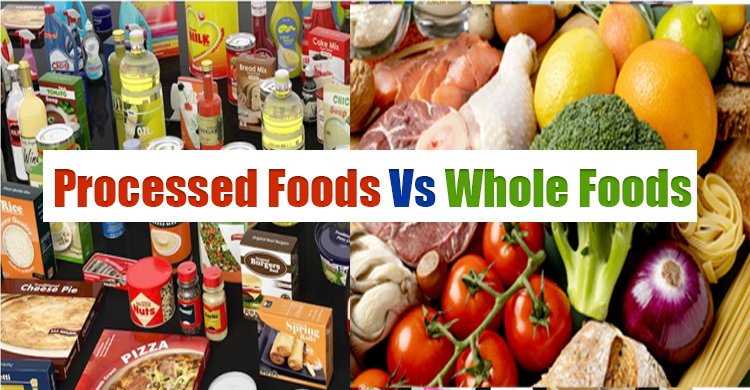![]()
![]()
![]()
![]()

In the fast-paced rhythm of modern life, where fast food and processed snacks often take center stage in our daily diets, it’s easy to underestimate the profound impact our food choices wield over our health. However, did you know that a simple shift from processed foods to a whole food diet, rich in nutrients, can revolutionize your overall well-being and facilitate weight management? In this blog post, we’ll delve into the compelling reasons to embrace whole foods, unveil the dangers lurking in processed options, and provide practical tips for integrating healthy recipes into your lifestyle.
Whole foods, in their unprocessed and natural state, emerge as nutritional powerhouses, housing essential nutrients vital for optimal bodily function. This nutrient-rich bounty includes vitamins, minerals, fiber, antioxidants, and phytochemicals, all contributing to enhanced digestion, fortified immune function, and heightened energy levels.
Opting for a whole food diet holds a key advantage in facilitating weight management. Unlike processed foods, laden with empty calories, refined sugars, and unhealthy fats, whole foods offer a sustained source of energy. The fiber content in these nourishing choices promotes a lasting sense of fullness, curbing overeating tendencies and actively aiding in weight control.

Processed foods, with their extensive ingredient lists and unpronounceable additives, present a nutritional minefield. Artificial preservatives, sweeteners, and flavor enhancers may enhance taste and shelf life, but they come at a cost to your health. These additives have been linked to various health issues, including inflammation, digestive problems, and even weight gain. By embracing a whole food diet, you eliminate the risk of exposing your body to processed foods.
Embarking on a whole food diet doesn’t need to be overwhelming. With a few simple guidelines, you can confidently navigate the aisles of your local grocery store and make wholesome choices for you and your family.
Shop the Perimeter: The perimeter of the grocery store is often a treasure trove of fresh produce, lean proteins, and dairy. Load up your cart with colorful fruits and vegetables, whole grains, and unprocessed meats.
Read Labels Mindfully: When selecting packaged foods, pay close attention to the ingredient list. Opt for products with minimal ingredients, steering clear of those with artificial additives, high levels of sodium, and added sugars.
Choose Whole Grains: Swap refined grains for whole grains like brown rice, quinoa, and whole wheat. These whole grains retain more nutrients and fiber, providing sustained energy and supporting digestive health.
Embrace Lean Proteins: Include lean protein sources such as chicken, fish, beans, and tofu in your meals. These options are not only nutrient-dense but also help keep you feeling full for longer periods.
Incorporate Healthy Fats: Choose sources of healthy fats, such as avocados, nuts, and olive oil, to support brain health and overall well-being.

While weight management is a notable benefit of embracing a whole food diet, the advantages extend far beyond the scale. Whole foods have been associated with a reduced risk of chronic diseases, including heart disease, diabetes, and certain cancers. The abundance of antioxidants in fruits and vegetables helps combat oxidative stress and inflammation, promoting longevity and a higher quality of life.
Transitioning to a whole-foods-based diet doesn’t entail sacrificing flavor or variety. Here are a few simple and delicious recipes to inspire your culinary journey:
Quinoa Salad with Colorful Vegetables:
Ingredients: Cooked quinoa, cherry tomatoes, cucumber, bell peppers, feta cheese, olive oil, lemon juice, salt, and pepper. Method: Toss all ingredients together for a refreshing and nutrient-packed salad.
Baked Salmon with Lemon and Herbs:
Ingredients: Salmon fillets, lemon slices, fresh herbs (such as dill or parsley), olive oil, salt, and pepper. Method: Marinate salmon in olive oil, herbs, and lemon slices before baking for a flavorful and protein-rich main course.
Fruit Smoothie Bowl:
Ingredients: Mixed berries, banana, Greek yogurt, honey, granola, and chia seeds. Method: Blend berries, banana, and yogurt for a delicious smoothie base, then top with honey, granola, and chia seeds for added texture and nutrition.

In the journey toward optimal health and weight management, the shift from processed foods to a whole food diet, rich in nutrients, is a small change with monumental benefits. By comprehending the power of whole foods, acknowledging the dangers of processed options, and making mindful choices at the grocery store, you can embark on a path to a healthier and more vibrant life. Embrace the simplicity and deliciousness of a whole food diet, and watch as your well-being flourishes with every nourishing bite.
Click here unveil the trending natural for reducing fat belly.